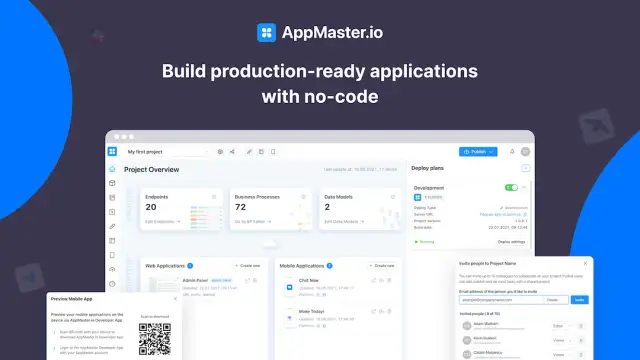Achieving Business Scalability with ERP Systems
Discover how implementing a robust ERP system can provide a strong foundation for business scalability by improving operational efficiency, data-driven decision-making and maximizing profits.

Understanding the Need for Scalable ERP Systems
Scalability is a crucial factor for businesses to stay competitive in today's fast-paced and ever-changing market environment. Companies must be able to adapt and expand their operations to meet increasing customer demands, respond to market opportunities, and maintain long-term success. Achieving scalability becomes even more complicated when considering the increasing complexity of business processes, regulatory compliance, and technological advancements.
ERP (Enterprise Resource Planning) systems are designed to address these challenges by providing an integrated platform to manage various aspects of an organization's operations. Scalable ERP systems cater to the changing needs of a growing business, enabling them to streamline processes, automate tasks, and centralize control across different departmental functions. An effective ERP system establishes a holistic view of an organization's resources and processes to facilitate data-driven decision-making, optimize resource allocation, and improve overall operational efficiency. A scalable ERP system is important for many reasons:
- Growing customer demands and increased competition
- Managing global operations and distributed supply chains
- Adhering to changing regulatory requirements
- Increased technological innovation and rapid digitization
- Organizational restructuring and expanding workforce
- Need for real-time reporting and actionable insights
By adopting a scalable ERP system, organizations can ensure they have the infrastructure to support their growth plans and manage their operational complexities efficiently.
Maximizing Operational Efficiency with ERP
Operational efficiency is a key performance indicator for business success. Implementing a powerful ERP system can significantly enhance operational efficiency by automating repetitive tasks, identifying and eliminating process inefficiencies, and reducing errors in data entry. Key areas in which ERP systems can improve operational efficiency include:
- Process Automation: ERP systems allow businesses to automate various time-consuming and mundane tasks, such as order processing, invoicing, and payroll management. This frees up employees to focus on tasks that generate value and contribute to business growth.
- Data Management and Collaboration: A centralized and integrated data management system ensures that all departments can access critical information in real-time. This eliminates data silos and fosters collaboration across the organization.
- Resource Management: Effective resource management is critical for managing costs and boosting profitability. ERP systems streamline personnel, materials, and machinery allocation, helping organizations optimize their resources for maximum efficiency and productivity.
- Improved Quality and Risk Management: With real-time tracking of critical metrics like production volumes, equipment performance, and defect rates, businesses can better identify and mitigate risks, resulting in improved product and service quality.
- Reduced Errors and Data Inconsistencies: By providing a single source of truth for the entire organization, ERP systems minimize the occurrences of errors and data inconsistencies caused by manual data entry or multiple disparate systems.
A scalable ERP system lays the foundation for businesses to improve operational efficiency and gain a competitive edge as they grow.
Data-Driven Decision Making for Business Growth
One of the key advantages of employing an ERP system is the access to accurate and real-time data, which plays a vital role in data-driven decision-making. With the ability to analyze information on customer behavior, workforce productivity, and financial performance, business leaders can make well-informed decisions that drive growth. Some ways in which an ERP system facilitates data-driven decision-making include:
- Real-time Insights: ERP systems provide real-time access to data on various business processes, allowing for up-to-date and accurate information that aids in effective decision-making.
- Advanced Analytics: By integrating advanced analytics functionalities, ERP systems can process raw data and deliver actionable insights. This enables organizations to identify trends, opportunities, and risks, and adjust their strategies accordingly.
- Forecasting and Scenario Analysis: ERP systems offer forecasting capabilities that support budgeting and resource allocation. By running various scenarios, businesses can adapt their strategies to respond to market dynamics and achieve their growth objectives.
- Performance Tracking: ERP systems provide key performance indicators (KPIs) to track and measure the progress of different departments and initiatives. This helps business leaders hold teams accountable and increase overall performance.
- Improved Collaboration and Information Sharing: ERP systems streamline communication across departments and teams by centralizing information and providing access to relevant data. This leads to better alignment across various functions and supports a data-driven culture.
The combination of real-time data, advanced analytics, and performance tracking capabilities empowers organizations to make data-driven decisions that directly contribute to their growth and success.
The Role of Real-Time Information in ERP Scalability
Real-time information plays a crucial role in achieving business scalability with ERP systems. By providing timely, accurate, and up-to-date data, ERP solutions empower businesses to make informed decisions, respond to market changes, and optimize their operations. Access to real-time data through ERP systems helps businesses in several ways:
- Improved decision-making: Timely and reliable data enables stakeholders to make well-informed decisions quickly. For example, real-time financial data allows the management team to identify cash flow issues and take necessary actions to address them. Similarly, access to up-to-date sales figures can aid in anticipating demand and adjusting pricing strategies accordingly.
- Enhanced collaboration: Real-time information sharing fosters collaboration across different departments, ensuring that everyone is working with the same data and assumptions. This helps in reducing miscommunication and streamlining decision-making processes, ultimately leading to more efficient execution of strategies.
- Increased responsiveness: Real-time data helps businesses respond swiftly to customer needs, market changes, and emerging opportunities. Supply chain managers can quickly identify bottlenecks and take corrective measures, while marketers can leverage insights from customer data to adjust their campaigns for better results.
- Better forecasting and planning: Real-time data enables businesses to make accurate forecasts with more confidence. By rapidly identifying trends and patterns, they can adjust their plans and optimize resources to meet their goals. This is particularly helpful when it comes to demand planning, inventory management, and production scheduling.

Streamlining Supply Chain and Resource Management
Streamlining supply chain and resource management is essential for business scalability. An effective ERP system can provide the tools and features needed to optimize these processes and maximize the potential for growth. By integrating various aspects of supply chain management, such as procurement, production planning, inventory control, and logistics, ERP systems can help businesses achieve the following benefits:
- Increased visibility and control: ERP solutions can provide real-time insights into the entire supply chain, allowing businesses to identify bottlenecks, monitor key performance indicators, and address potential inefficiencies. Greater visibility into supply chain operations enables companies to proactively manage processes and make data-driven decisions.
- Enhanced communication: ERP systems can facilitate seamless communication between different stakeholders within the supply chain, including suppliers, manufacturers, distributors, and retailers. By improving collaboration and information sharing, businesses can optimize their supply chain operations and ensure timely delivery of products.
- Better demand forecasting: Accurate demand forecasting is crucial for efficient supply chain management and resource allocation. ERP systems can analyze historical sales data, market trends, and other relevant factors to generate more reliable demand forecasts, helping businesses to make informed decisions about inventory levels, production schedules, and procurement.
- Optimized inventory management: ERP solutions can help businesses maintain optimal inventory levels by continually monitoring demand, analyzing stock levels, and initiating replenishment orders as needed. This minimizes the risk of stockouts and reduces carrying costs associated with excess inventory.
Balancing Flexibility and Standardization
For an ERP system to support business scalability, it must strike a balance between flexibility and standardization. The system should be adaptable enough to handle the ever-changing needs of a growing business while maintaining consistency across the organization.
- Flexibility: As businesses grow, they often encounter changing markets, evolving customer needs, and emerging technologies. A flexible ERP system allows companies to adapt to these changes and incorporate new processes, technologies, and best practices as needed. For example, a company expanding its product offerings needs an ERP system that can seamlessly accommodate new product lines, incorporate them into existing workflows, and integrate with other third-party applications.
- Standardization: Standardization is essential for maintaining organizational consistency, streamlining workflows, and ensuring data integrity. A standardized ERP system can help businesses enforce best practices, maintain compliance with industry regulations, and improve overall process efficiency. This is especially critical when managing a large, distributed workforce or operating in multiple geographic locations. Finding the right balance between flexibility and standardization depends on your company's specific needs, growth strategy, and industry requirements.
By investing in a scalable ERP solution that combines the right mix of flexibility and standardization, your business can thrive in an ever-changing market environment and enable continuous growth. In conclusion, achieving business scalability through ERP systems requires a focus on real-time information, streamlining supply chain and resource management, and balancing flexibility with standardization.
With the right ERP platform, your business can enjoy improved decision-making capabilities, increased responsiveness, better collaboration, and overall operational efficiency. And by leveraging the power of the AppMaster platform, you can seamlessly integrate your ERP system, unlocking additional scalability potential and driving business growth.
Finding the Perfect ERP System for Your Business
With a plethora of ERP systems available in the market, it can be challenging to find the perfect solution for your organization. Selecting the right ERP system is critical for achieving business scalability and necessary capabilities for growth. Here are some factors to consider when evaluating ERP systems:
Cost and Return on Investment (ROI)
The cost of ERP systems varies widely, and it is important to consider your budget while also evaluating the potential ROI. A system with a very high upfront cost may not necessarily provide the best value if it does not offer significant benefits in terms of scalability and efficiency. On the other hand, a cheaper ERP system that lacks powerful features may inhibit your company's ability to scale and adapt to changing market conditions. Conduct a cost-benefit analysis to determine which system offers the best ROI while considering long-term growth potential.
Functionality and Modules
ERP systems offer a wide range of modules that cater to different aspects of your business. Ensure the system you choose covers all critical functions like finance, human resources, supply chain management, and production planning. Moreover, the chosen system should support integration with other essential business tools like CRM, business intelligence solutions, and industry-specific software to provide a comprehensive solution that drives growth. Take time to assess each module's capabilities and evaluate how they will enhance your organization's efficiency and scalability.
Industry-Specific Solutions
Several ERP systems offer industry-specific solutions tailored to cater to unique requirements that arise due to regulatory compliance, industry standards, and specialized processes. Such systems can provide a better fit for scalability and growth owing to their precisely engineered components. Investigate ERP systems that have a proven track record within your industry, and consult with industry peers or experts to validate their suitability and efficacy.
Scalability and Ease of Customization
As your business grows, your ERP system should be able to adapt to the changing needs of your organization without causing disruptions or inefficiencies. Assess how easily the ERP system can be customized to accommodate new processes and evaluate compatibility with your company's future expansion plans, such as acquiring new subsidiaries, entering new markets, or adding new products to the portfolio.
Vendor support and Implementation
Implementing an ERP system can be a complex process, and it is crucial to have reliable vendor support throughout implementation and post-implementation stages. Evaluate the vendor's track record for successful implementations, and ask for case studies or references to validate their claims. Ensure that the vendor provides comprehensive support services, such as training, regular updates, and technical assistance to reduce downtimes and ensure a smooth transition.
Taking these factors into account, conduct thorough research, and consider seeking expert assistance for selecting the most suitable ERP solution for your organization's needs.
Integrating ERP Systems with AppMaster Platform
Integrating an ERP system with a powerful no-code platform like AppMaster can provide significant benefits in terms of achieving business scalability through rapid application development, reducing technical debt, and maintaining operational efficiency. By leveraging AppMaster's capabilities, you can build powerful custom applications that cater to your organization's unique needs while also harnessing the power of an ERP system. Here are some advantages of integrating your ERP system with AppMaster:
Custom Solutions with No Technical Debt
Building custom applications on the AppMaster platform enables your organization to create tailored solutions that can address your specific business needs. What sets AppMaster apart from other no-code platforms is its ability to generate applications from scratch every time there is a change in requirements, thus eliminating technical debt. This approach ensures the long-term sustainability and stability of your custom applications by easily adapting to changing business requirements without incurring burdensome technical debt.

Enhanced Data Processing and Decision-Making
Integrating your ERP system with AppMaster Platform enables real-time data processing and accessibility, providing your organization with essential insights for data-driven decision-making. By leveraging AppMaster's capabilities, you can build applications with powerful data analytics and visualization features. These applications empower your organization to derive valuable insights from ERP data, allowing better-informed decisions to drive business growth and scalability.
Streamlined Business Processes
The combination of an ERP system and AppMaster Platform allows you to build custom applications that streamline your business processes, enabling your organization to operate more efficiently. With AppMaster's no-code development environment, you can rapidly build applications that automate repetitive tasks, reduce manual errors, and improve overall efficiency. This speed of development empowers your organization to quickly iterate on solutions and adapt to evolving market conditions.
Compatibility with Multiple Databases and Scalability
When connected to the AppMaster Platform, your organization can benefit from the platform's compatibility with multiple PostgreSQL-compatible databases for both backend and web applications. Such compatibility, along with the use of Go-generated stateless backend applications, unleashes the scalability potential required to support enterprise and high-load use cases.
In conclusion, the integration of your ERP system with the AppMaster Platform enables your organization to build and deploy powerful custom no-code applications that streamline operations, enhance data-driven decision-making, and drive business scalability. By consolidating the power of your ERP system with AppMaster's extensive capabilities, your organization stands to benefit from a future-proof solution to support long-term growth and success.
FAQ
An ERP (Enterprise Resource Planning) system is a suite of integrated business applications designed to automate and streamline a wide range of business processes, from finance to human resources, and supply chain management.
Business scalability is the ability of a company to adapt and expand its operations as it grows. It is critical for ensuring long-term success by maintaining efficiency, managing resources, and increasing profitability.
An ERP system can improve operational efficiency by automating repetitive tasks, reducing data entry errors, and streamlining processes. This ultimately frees up resources and enables businesses to focus on more important, value-added tasks.
Data-driven decision-making provides insights from real-time data to help business leaders make informed decisions. ERP systems offer robust tools for data collection, processing, and analysis, supporting effective decision-making that drives business growth.
ERP systems can streamline supply chains by connecting various processes like procurement, production planning, and inventory management. They can also improve communication between suppliers, enable accurate demand forecasting, and automate shipping and logistics.
Balancing flexibility and standardization allows an ERP system to remain adaptable to changing business needs while maintaining consistency across the organization. It helps support scalability in hierarchical structures and regulated processes.
Choosing the right ERP system requires considering factors such as cost, functionality, scalability, and support for industry-specific processes. It is essential to conduct thorough research and consult with experts to find the best fit for your organization.
Integrating an ERP system with AppMaster Platform can help in rapidly building and deploying custom no-code solutions that streamline operations, reduce technical debt, and enhance business scalability. It also supports real-time data processing for informed decision-making.





